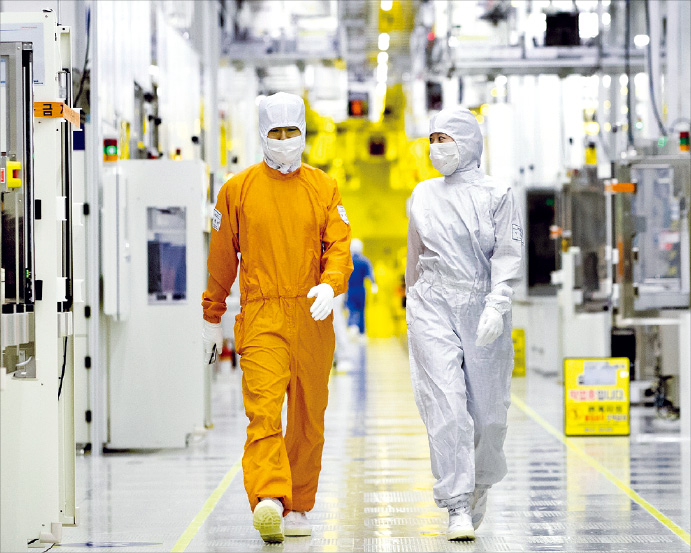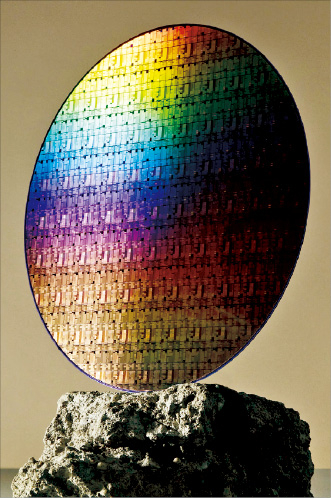Samsung flexes foundry muscle amid supply chain woes
Samsung ready to narrow gap with TSMC as fabless companies diversify outsourcing channels
By Dec 15, 2021 (Gmt+09:00)

Samsung Electronics Co. may emerge a winner in the prolonged pandemic era, making full use of fabless chipmakers' efforts to diversify the manufacturers of chips they design beyond the dominant leader TSMC Co.┬Ā
Amid little sign of the global chip shortage easing, IBM Corp. and Switzerland-based STMicroelectronics recently placed foundry orders with Samsung Electronics, opting for shorter wait times rather than waiting longer for TSMC-made chips.
The chips to be supplied to IBM will be used in next-generation servers, which require the most advanced fabrication technology.
For STMicroelectronics, it was the first time for the Swiss company to outsource the production of microcontroller units (MCUs) to be supplied to its key customers. The microcontrollers, to be produced in the 16-nanometer fabrication process, will be embedded in Apple Inc.'s next-generation iPhones.
The order from STMicroelectronics marked the first MCU order for Samsung since it secured an MCU contract from NXP in the Netherlands in 2017. MCUs have been hit the hardest by supply chain bottlenecks. For some types of microcontrollers, it takes up to 40 weeks for delivery, according to industry sources.
Since MCUs are used in a wide array of systems and devices, the latest MCU order raises expectations that Samsung could expand into the automotive MCU segment within the foundry market.
"Major fabless companies are making various efforts to reduce supply chain risk," said a source at the Korea Semiconductor Industry Association on Wednesday. "As they are diversifying their manufacturers, Samsung will take a bigger slice of the market."┬Ā
Samsung is aiming to overtake TSMC by 2030. But its global foundry market share slipped by 0.2 percentage points on-quarter to 17.1% in the third quarter, according to market tracker TrendForce.
By contrast, TSMC's share expanded by the same margin to 53.1% during the period, versus 52.9% in the second quarter. Two Taiwanese foundry companies -- TSMC and United Microelectronics Corporation -- command 80% of the world's foundry market.
Now the global chip shortage is pushing fabless companies to diversify their manufacturers for shorter delivery times.
The lead time between the placement of an order and delivery of an analog chip has lengthened to 22 weeks, compared with the previous years' average of six to nine weeks, according to Susquehanna International Group, a market research firm.
SEMICONDUCTOR ECOSYSTEM
It may not be only IBM and STMicroelectronics that outsource their chip production to Samsung. Advanced Micro Devices, Inc., a US-based semiconductor company, is considering placing a foundry order for central processing units (CPUs) with Samsung, according to the sources. The 5-nanometer CPUs would be embedded in the Chromebooks operating system.
To overtake the dominant rival TSMC, which boasts customized products for each customer, Samsung focuses on strengthening cooperation networks with client companies under a semiconductor ecosystem it is building.
To this end, it has set up the Samsung Advanced Foundry Ecosystem (SAFE) which includes ARM, Siemens and Synopsys, a chip designing company, as members. Recently, Xpeedic, an electronic design automation company, and five other companies joined the SAFE.┬Ā
Under the ecosystem, Samsung will not only produce chips designed by its clients, but also work together with them from the designing stage to post-processing operations.

Samsung teamed up with IBM to develop a new vertical transistor, which reduces energy usage by 85%, compared with the scaled fin field effect transistor (finFET).
Unlike conventional transistors that lie flat upon the surface of a semiconductor, the new vertical transport field effect transistors (VTFETs) are placed perpendicular to the surface of the chip with vertical current flow, IBM said on Dec. 14.
┬Ā
Prior to the transistor design, Samsung cooperated with Google from the development stage of the application processor (AP) used in Google's latest smartphone and finally won its foundry order.
Write to Su-bin Lee at lsb@hankyung.com
Yeonhee Kim edited this article.
-
 SemiconductorsWinter is over? Samsung's Q3 chip sales beat Intel's
SemiconductorsWinter is over? Samsung's Q3 chip sales beat Intel'sDec 13, 2021 (Gmt+09:00)
3 Min read -
 Foundry businessSamsung to produce STMicro's MCUs for use in iPhones
Foundry businessSamsung to produce STMicro's MCUs for use in iPhonesDec 13, 2021 (Gmt+09:00)
1 Min read -
 Foundry competitionSamsung surprises foundry industry with plan for 2 nm chips
Foundry competitionSamsung surprises foundry industry with plan for 2 nm chipsOct 10, 2021 (Gmt+09:00)
3 Min read




